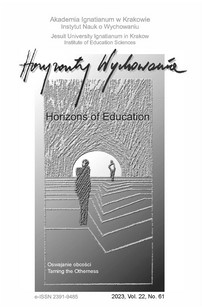Proces badawczy w krytyczno partycypacyjno‑edukacyjnych badaniach w działaniu – rekonesans i dynamiczne cykle działaniowe
The Research Process in Critical‑Participative‑Educational Action Research – Reconnaissance and Dynamic Action Cycles
Author(s): Agata BorowskaSubject(s): Education, Methodology and research technology
Published by: Uniwersytet Ignatianum w Krakowie
Keywords: CPAR M2S; research reconnaissance; dynamic action cycles; action spirals; research community;
Summary/Abstract: RESEARCH OBJECTIVE: Deeper learning and explaining the essence of the research process in critical-participatory-educational action research, taking into account research reconnaissance and dynamic action cycles; they constitute research stages based on the interpretative paradigm and the tradition of participatory research.THE RESEARCH PROBLEMS AND METHODS: The article focuses on the understanding of CPAR M2S and its role in the process of creating knowledge and improving practice; the article uses a discursive analysis of understanding and explaining the research process in the tradition of participatory research, originating from the actionist movement for community development.THE PROCESS OF ARGUMENTATION: The content of the article explains the stages of the process of research inquiry that does not take into account the rigid canons of methodological-positivist inquiries and does not fit into the category of so-called “applied research.”RESEARCH RESULTS: The CPAR is not technical and instrumental improvement of educational practice; it cannot be unreflectively identified only with an educational (didactic) project; the main differentiating element is the identification of the research problem by the group of respondents (not at the command of the management); the educational space becomes a place where knowledge about practice is generated and teachers are critically reflective of their actions (practice) so far, aimed at change.CONCLUSIONS, INNOVATIONS AND RECOMMENDATIONS: The article takes into account the aspect of variability and research dynamism present in action research and describes the role of a researcher of action, educational „moments” bringing new directions of thinking and action in order to create knowledge and improve practice.
Journal: Horyzonty Wychowania
- Issue Year: 22/2023
- Issue No: 61
- Page Range: 149-159
- Page Count: 11
- Language: Polish

